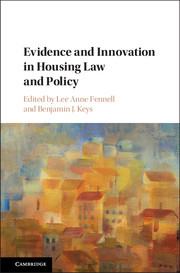Evidence and Innovation in Housing Law and Policy
No area of law and policy is more central to our well-being than housing, yet research on the topic is too often produced in disciplinary or methodological silos that fail to connect to policy on the ground. This pathbreaking book, which features leading scholars from a range of academic fields, cuts across disciplines to forge new connections in the discourse. In accessible prose filled with cutting-edge ideas, these scholars address topics ranging from the recent financial crisis to discrimination and gentrification and show how housing law and policy impacts household wealth, financial markets, urban landscapes, and local communities. Together, they harness evidence and theory to capture the “state of play” in housing, generating insights that will be relevant to academics and policy makers alike. This title is also available as Open Access on Cambridge Core at http://dx.doi.org/10.1017/9781316691335.
Lee Anne Fennell is Max Pam Professor of Law and the co-director of the Kreisman Initiative on Housing Law and Policy at the University of Chicago Law School. Her teaching and research interests include property, torts, land use, housing, social welfare law, state and local government law, and public finance. She is the author of The Unbounded Home: Property Values Beyond Property Lines (2009).
Benjamin J. Keys is an assistant professor of real estate at the Wharton School at the University of Pennsylvania and a Faculty Research Fellow of the National Bureau of Economic Research. He previously served as co-director of the Kreisman Initiative while an assistant professor at the Harris School of Public Policy at the University of Chicago. Keys’s research interests include connections between mortgage finance, household finance, and macroeconomics. His work has been published in academic journals such as the American Economic Review and the Quarterly Journal of Economics.



